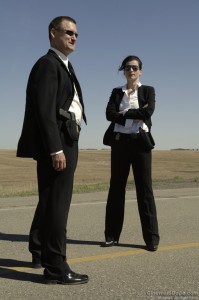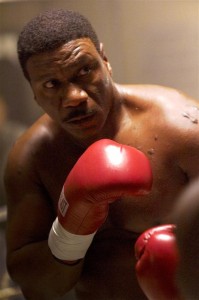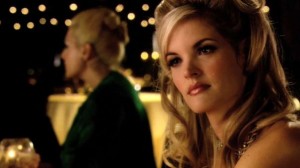The Art of Respectable Anonymity: Film Festivals Part I
 Do filmmakers make movies for the accolades? The money? The challenge? The answer is entirely subjective, but those that do it for the accolades, how do they feel about the intimacy and vacuum of a film festival screening? The crowd has paid more than they would for a regular ticket, often to see a movie they’ve never heard of that had a halfway interesting description in the newspaper, program guide, or on a website. They want to like the movie, they root for it, like a parent attending their child’s school play and wincing while they butcher the lines, but wiping that memory away in favor of cherishing the experience instead of the performance. But filmmakers are not 7 years old.
Do filmmakers make movies for the accolades? The money? The challenge? The answer is entirely subjective, but those that do it for the accolades, how do they feel about the intimacy and vacuum of a film festival screening? The crowd has paid more than they would for a regular ticket, often to see a movie they’ve never heard of that had a halfway interesting description in the newspaper, program guide, or on a website. They want to like the movie, they root for it, like a parent attending their child’s school play and wincing while they butcher the lines, but wiping that memory away in favor of cherishing the experience instead of the performance. But filmmakers are not 7 years old.
Filmmakers do want to sell their movie, and often a festival is the best way to go about it if they financed it independently, despite how much whoring and ass-kissing they have to do with sleazy distribution reps just to make sure they fill the screening. But what about the smaller festivals where sales are few and far between and the films showing have less cache, often on their second or third run around the circuit? Obviously, this doesn’t refer to the large, famous festivals such as Cannes, Toronto, Sundance, or Telluride, but to one you didn’t even know existed, and not because it covered a genre you don’t follow (Horror? Sci-fi? Gay?), but a general one that is only well known in those small circles that get excited about street fairs and when the circus comes to town, even though they don’t have kids. Creepy and enthusiastic? Yep.
 That isn’t to say there aren’t good movies that play at the smaller festivals (such as Sugar), but you’re more likely to get something that is at best mediocre and reassuring [and will therefore win the audience award] or so bizarre and unwatchable you assume that the movie was programmed in A Clockwork Orange-style experiment to torture the viewer into submission. Such things did occur to me at the Philadelphia Film Festival, which was mostly made up of the leftovers of the unwanted and undistributable (like Jennifer Chambers [David] Lynch’s follow-up to Boxing Helena, the dreadful Surveillance, which has been floating around for almost three years, despite a name cast), or unfortunately dominated by the number of films that were already on DVD either locally or in other countries. The latter problem is an ongoing one that smaller festivals will have to deal with for the foreseeable future, if the films are on DVD somewhere, they can be downloaded illegally, and the viewer can pass up traveling to the theater and paying for a screening of a film that has no hope of being seen elsewhere. How, if festivals are programmed months in advance, can you compete with the unknown, unless you only screen American studio films, which defeats the entire purpose of a festival? There’s no way to control the natural 3 month window between theatrical and DVD release in foreign countries, and a real find, normally thought of as a coup, is totally moot, because there’s a cheap DVD available in Thailand or France or Australia or…
That isn’t to say there aren’t good movies that play at the smaller festivals (such as Sugar), but you’re more likely to get something that is at best mediocre and reassuring [and will therefore win the audience award] or so bizarre and unwatchable you assume that the movie was programmed in A Clockwork Orange-style experiment to torture the viewer into submission. Such things did occur to me at the Philadelphia Film Festival, which was mostly made up of the leftovers of the unwanted and undistributable (like Jennifer Chambers [David] Lynch’s follow-up to Boxing Helena, the dreadful Surveillance, which has been floating around for almost three years, despite a name cast), or unfortunately dominated by the number of films that were already on DVD either locally or in other countries. The latter problem is an ongoing one that smaller festivals will have to deal with for the foreseeable future, if the films are on DVD somewhere, they can be downloaded illegally, and the viewer can pass up traveling to the theater and paying for a screening of a film that has no hope of being seen elsewhere. How, if festivals are programmed months in advance, can you compete with the unknown, unless you only screen American studio films, which defeats the entire purpose of a festival? There’s no way to control the natural 3 month window between theatrical and DVD release in foreign countries, and a real find, normally thought of as a coup, is totally moot, because there’s a cheap DVD available in Thailand or France or Australia or…
So how does a viewer handle the knowledge that 80% of the movies showing can be seen for free, without leaving the house? Well, you have to either convince yourself that you’ll never track down the disc or compressed file and the theater is the best way to see it, or be an honorable person. Since the latter option is nearly impossible, what you have to do is pick your films wisely. Situations such as the screening of Tyson I went to, already a movie shot on low quality video equipment, it was on the internet literally two days later, likely in a version that looked better than the blown-up to 35MM film/video I saw, is becoming all too common.
 What I chose to do was cram in a lot of films in early and then catch up to ones that piqued my interest before I got burned out. However, that was before I witnessed as sad a sight as Robert Townsend’s Phantom Punch, which attempted to chronicle the life and death of former heavyweight champion Sonny Liston, who knocked out the well-liked Floyd Patterson before famously being beaten twice by Cassius Clay, the second of which appeared to be by a punch that barely grazed him. Ving Rhames both starred in and produced the movie, which seemed like a good omen, until it became clear that there was either no money behind it or Townsend had gone back to his comedy roots, but didn’t tell anyone on set.
What I chose to do was cram in a lot of films in early and then catch up to ones that piqued my interest before I got burned out. However, that was before I witnessed as sad a sight as Robert Townsend’s Phantom Punch, which attempted to chronicle the life and death of former heavyweight champion Sonny Liston, who knocked out the well-liked Floyd Patterson before famously being beaten twice by Cassius Clay, the second of which appeared to be by a punch that barely grazed him. Ving Rhames both starred in and produced the movie, which seemed like a good omen, until it became clear that there was either no money behind it or Townsend had gone back to his comedy roots, but didn’t tell anyone on set.
 Phantom Punch is inept enough to make you wonder if the movie was finished at all. I felt embarrassed at several moments, and not just from the poor integration of stock footage, or the fight choreography that looks like Townsend never told the actors that boxers actually hit each other and occasionally move from side to side, not just stand in place and push out their arms, or that this version of Muhammad Ali/Cassius Clay is totally graceless and lacking any athletic ability. It wasn’t just the combination of scenes that don’t resemble anything from Liston’s life, or that none of the questions about Liston’s mysterious death or his famous boxing flop were answered, or the tiny boxing rings with atmospheric smoke to [badly] cover up that there’s no one watching the fight (the rings and arenas for the heavyweight championship fights were the same ones used for the prison fights, or so it appeared), or that Howard Cosell was played by a black man. Actually, that one was really odd and distracting. And one of many things that were just bewildering to see, from the bad lip-syncing by night-club singers, the choice to shoot on the type of video that looks just like Red Shoe Diaries, the awful performances by Stacey Dash as Liston’s wife and Bridgette Wilson’s lounge singer/prostitute. But I have to get back to the fact that Phantom Punch all plays like parody. The movie looks so much like a sketch in Townsend’s first film Hollywood Shuffle, a black and white piece about a criminal with a Jheri Curl problem/hairspray addiction, that you have to question it. Even the melodrama of Phantom Punch is dead-on, using the exact same silly emoting tools as Townsend’s soap opera parody from his Partners in Crime HBO specials, entitled The Bold, The Black, and The Beautiful. If you could chart exactly when a satirist loses his mind and thinks the clichés he’s mocking are actually real emotion, Phantom Punch would be exhibit A.
Phantom Punch is inept enough to make you wonder if the movie was finished at all. I felt embarrassed at several moments, and not just from the poor integration of stock footage, or the fight choreography that looks like Townsend never told the actors that boxers actually hit each other and occasionally move from side to side, not just stand in place and push out their arms, or that this version of Muhammad Ali/Cassius Clay is totally graceless and lacking any athletic ability. It wasn’t just the combination of scenes that don’t resemble anything from Liston’s life, or that none of the questions about Liston’s mysterious death or his famous boxing flop were answered, or the tiny boxing rings with atmospheric smoke to [badly] cover up that there’s no one watching the fight (the rings and arenas for the heavyweight championship fights were the same ones used for the prison fights, or so it appeared), or that Howard Cosell was played by a black man. Actually, that one was really odd and distracting. And one of many things that were just bewildering to see, from the bad lip-syncing by night-club singers, the choice to shoot on the type of video that looks just like Red Shoe Diaries, the awful performances by Stacey Dash as Liston’s wife and Bridgette Wilson’s lounge singer/prostitute. But I have to get back to the fact that Phantom Punch all plays like parody. The movie looks so much like a sketch in Townsend’s first film Hollywood Shuffle, a black and white piece about a criminal with a Jheri Curl problem/hairspray addiction, that you have to question it. Even the melodrama of Phantom Punch is dead-on, using the exact same silly emoting tools as Townsend’s soap opera parody from his Partners in Crime HBO specials, entitled The Bold, The Black, and The Beautiful. If you could chart exactly when a satirist loses his mind and thinks the clichés he’s mocking are actually real emotion, Phantom Punch would be exhibit A.



